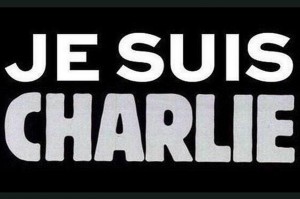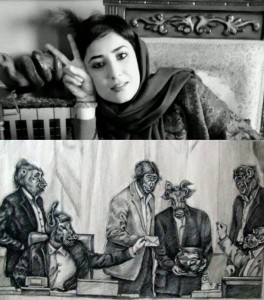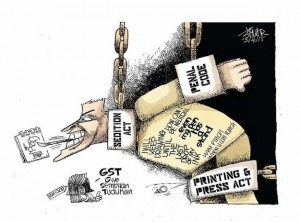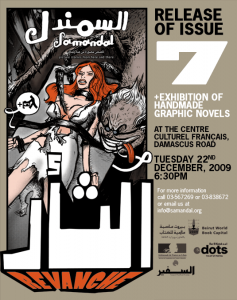2015 wasn’t just a benchmark year for censorship in the United States, where we fought more challenges to graphic novels and books than we’ve ever seen. International censorship was on the rise, culminating in literal attacks on cartoonists around the world. Let’s take a look at some of the international stories CBLDF covered in 2015…
 The Charlie Hebdo Attack
The Charlie Hebdo Attack
On January 7, the world was stunned into silence as terrorists attacked the offices of French satirical magazine Charlie Hebdo in Paris. Twelve people — including the cartoonists Charb, Cabu, Wolinski, Tignous, and Philippe Honoré — were killed in the attack, which was in retaliation for the magazine’s occasional caricatures of the Prophet Muhammad, among many other religious and political figures.
The world did not stay silent for long, as people declared “Je Suis Charlie” (“I am Charlie”), and cartoonists used their pens to express their sorrow, fear, and outrage over the attack. CBLDF officially condemned the attack and joined PEN America and Index on Censorship in publishing some of Charlie‘s most controversal cartoons in defiance of those who would use violence to stifle free speech.
The repercussions of the attack were evident in numerous stories throughout 2015 and surely for many years to come.
- BREAKING NEWS: Charlie Hebdo Attack Kills 12, Including 5 Cartoonists
- CBLDF Joins Condemnation of Charlie Hebdo Attack
- Stand Up for Free Speech: Publish Charlie Hebdo’s Cartoons
- A Moment of Speech: Charlie Hebdo’s Controversial Cartoons
- World Mourns Victims of Charlie Hebdo Attack
- Comics World Responds to Charlie Hebdo Attack
- Still Defiant: New Issue of Charlie Hebdo Sells Out
- Cartoonists Around the World Stand In Support of Charlie Hebdo
- Angoulême Honors Fallen Charlie Hebdo Staff with “Charlie Freedom of Speech” Award
- Dylan Horrocks Reports from France in Wake of Charlie Hebdo Attacks
- Asterix Cartoon Raises More Than $150,000 for Families of Charlie Hebdo Attack Victims
- Garry Trudeau Argues that Charlie Hebdo Crossed a Satirical Red Line
- Fear for Reputation Leads Queen’s University to Cancel Charlie Hebdo Conference
- Australia Presents Cartoonist’s Work in Solidarity with Charlie Hebdo
- CBLDF Joins NCAC Response to Charlie Hebdo PEN America Award Controversy
- Cartoonist to Leave Charlie Hebdo Amid Staff Tensions
- No, Charlie Hebdo Has Not Stopped Printing Mohammed Cartoons
- Salman Rushdie: The World Has “Learned the Wrong Lessons” from Charlie Hebdo
- Harvard Library Building Archival Collection on Charlie Hebdo Attacks
- Charlie Hebdo Editor’s Posthumous Free Expression Manifesto Out Next Month
 Iranian Cartoonist Sent to Jail for Drawing
Iranian Cartoonist Sent to Jail for Drawing
Iranian artist and activist Atena Farghadani was given a draconian sentence of 12 years and 9 months in prison for drawing a cartoon depicting lawmakers as apes and bovines. The cartoon mocked a bill that would ban various forms of birth control, including voluntary sterilization procedures such as vasectomies and tubal ligations, in an effort to reverse Iran’s falling birthrate.
After her sentencing, which followed a cursory trial led by a judge well-known for throwing the book at political activisits, Farghadani’s troubles continued as she and her lawyer were both charged with “non-adultery illegitimate relations” because they shook each other’s hands. Contact with unrelated members of the opposite sex is illegal in Iran, but rarely prosecuted. It was later disclosed that in the course of this secondary investigation, Farghadani was subjected to forced virginity and pregnancy tests.
In September, Cartoonists Rights Network International honored Farghadani in absentia with its Courage in Editorial Cartooning Award.
- Cartoonist Sentenced to 12 Years in Prison for Mocking Birth Control Bill
- Iranian Cartoonist Faces Prison, Floggings for Mocking Birth Control Bill
- Cartoonists #Draw4Atena
- Atena Farghadani’s Lawyer Also Under Arrest in Iran
- Fellow Cartoonists Honor Atena Farghadani at CRNI Courage Award Ceremony
- Farghadani Subjected to Virginity Test in Investigation of “Illegitimate Relations”
 Malaysian Cartoonist Zunar Faces 43 Years in Prison
Malaysian Cartoonist Zunar Faces 43 Years in Prison
The latest round of the Malaysian government’s ongoing harassment against political cartoonist Zunar came to a head in February when he was charged with nine counts of sedition, which could carry a total sentence of up to 43 years in prison.
Zunar has been sparring with the ruling Barisan Nasional party for years, and most of his cartoon books are or have been officially banned in Malaysia. The sedition charges stem from statements that he made on Twitter following the sentencing of opposition leader Anwar Ibrahim on a trumped-up sodomy charge. Zunar hinted that the judiciary in that trial had been subject to political pressure or bribery, observing that “the lackeys in black robes are proud of their sentences. The reward from political masters must be plenty.” He then exchanged Twitter barbs — and a cartoon — with Inspector-General of Police Khalid Abu Bakar as officers were en route to arrest him.
Zunar, his staff, and supporters encountered further harassment as the year progressed, but Zunar remained characteristically defiant as his trial was postponed multiple times, most recently because Zunar is challenging the constitutionality of the sedition law under which he is being prosecuted, a law that predates the drafting of Malaysia’s constitution.
- Zunar Arrested for Twitter Criticism of Malaysian Government
- Zunar Charged with Nine Counts of Sedition
- Zunar Remains Defiant Before Trial
- Malaysian Court Allows Government to Appeal Lifting of Zunar Ban
- Zunar’s Sedition Trial Postponed to July
- Zunar’s Sedition Trial Delayed Again
- Zunar Receives Grant Support from Human Rights Watch
- Zunar’s Sedition Trial Postponed for Third Time
- Zunar Trial to Proceed After Malaysian Court Rules on Sedition Act
- Zunar to Tour Europe Ahead of Sedition Trial
- Zunar Launches Legal Challenge to Malaysia’s Sedition Act
- Top Malaysian Court Finds No Justification for Ban on Zunar Books
- Zunar in U.S. to Receive CPJ International Press Freedom Award
 Cartoonist Sonny Liew Loses Singapore Arts Grant
Cartoonist Sonny Liew Loses Singapore Arts Grant
Due to unease over the book’s content, the National Arts Council in Singapore withdrew its grant to aid in the publication on Sonny Liew’s The Art of Charlie Chan Hock Chye.
The book, which was released in Malaysia this past month and is slated for release in the United States and other countries in 2016, represents a milestone in not only Liew’s career, but also for his home country of Singapore’s growing comics industry. Meshing fiction and non-fiction, Liew’s book is a historical expose of Singapore’s recent history and the individuals who helped shape the country. Tackling a difficult subject like Singapore’s historical struggle for independence, including the Hock Lee bus riots and notable figures Lee Kuan Yew and Lim Chin Siong and the repression of free expression, some — including Liew himself — had worried that the subject matter would impact the book’s publication.
In spite of this financial blow, though, Epigram Books — the Asian publisher of the book — went ahead with releasing the book, and within one short week all 1,000 copies printed sold out. “For most graphic novels, we print about 1,000 on average and these take two years to sell out,” founder of Epigram Books, Edmund Wee said. At least two additional printings were ordered to meet demand.
- Censorship by Financial Sabotage: Cartoonist Sonny Liew Loses Singapore Arts Grant
- Financial Setback Doesn’t Stop Sonny Liew Graphic Novel from Selling Out
- EXCLUSIVE: CBLDF Talks with Sonny Liew About The Art of Charlie Chan Hock Chye and Censorship
- Singapore Writers Say No to Governmental Funding of the Arts
UN Special Envoy Calls for Ban on “Extreme” Manga
After UN Special Envoy Maud de Boer-Buquicchio recommended that Japan take steps to “ban manga of extreme child pornographic content,” along with a host of other tips for curtailing child sexual abuse in the country, CBLDF Executive Director Charles Brownstein wrote an in-depth commentary analyzing the cultural differences in the way manga is received and the reasons why banning manga would accomplish nothing to protect actual children.
- Why Banning Extreme Manga Fails To Protect Children
- UN Envoy Recommends Japanese Ban on Some Manga and Anime
 Lebanese Comics Collective Fights Government Censorship
Lebanese Comics Collective Fights Government Censorship
A five-year-old court case surrounding the controversial publication of religious-themed comics in a Lebanese magazine concluded in 2015 with three editors/artists of the magazine being found guilty of belittling Christianity, and each was fined $20,000.
In 2007, cartoonists Omar Khouri, Hatem Imam, and Fadi Baki founded the magazine Samandal, a trilingual publication out of Beirut that became one of the premier magazines for publishing both Middle Eastern and European comics. Addressing contemporary social issues, the magazine quickly became a venue that Lebanese cartoonists could use to talk about their lives, and it attracted the attention of European cartoonists as well.
In the seventh issue of the magazine, two cartoons were published that would put the three editors at the center of protracted legal proceedings and censorship battles. One cartoon by Lena Merhej, entitled “Lebanese Recipes for Revenge,” took common Lebanese phrases and illustrated them in a more literal sense. The cartoon depicted the phrase “May [God] burn your religion,” and showed a priest and imam doused in gasoline and set on fire. It caught the attention of the General Security and led to charges of “inciting sectarian strife” and “denigrating religion.”
Financially crippled, the magazine turned to crowdfunding in a last-ditch effort to survive. With its Indiegogo campaign, the association hopes to finance its next two annual anthologies, an online archive of back issues, and the hiring of a part-time coordinator.
- 5 Year Court Battle Leads to Censorship of Lebanese Comics Magazine
- Lebanese Comics Collective Counters Government Censure with Crowdfunding Campaign
- Lebanese Editors Use Government Censorship to Make More Comics
View our previous year-in-review coverage:
- CBLDF’s Top 15 Stories of 2015
- CBLDF Joins Coalition Efforts to Defend Books in 2015
- 10 Comics CBLDF Defended in 2015
- CBLDF Takes Legal Action to Protect the Freedom to Read in 2015
- CBLDF’s Education Work in 2015
These are just a few of the international stories CBLDF covered in 2015. Help support CBLDF’s important First Amendment work and reporting on censorship news in 2016 by visiting the Rewards Zone, making a donation, or becoming a member of CBLDF!